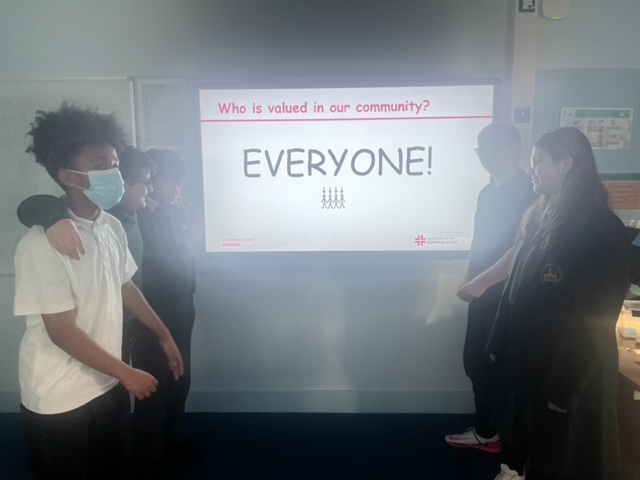
A school rooted in community can be a force for the common good
When trust is broken and the social fabric is torn, when loneliness is higher in the young than the old, how do we prepare our young people for an uncertain future? Our 10-week Common Good Schools programme for 11-16 year olds enables young people to value each other and local neighbours, to build relationships, to grow in character and resilience. Here, Jo Stow visits a T4CG partner school which has adapted our resource for SEN children needing speech and language support. Seeing the students thriving by learning to take responsibility, she reports on how their developing skills can be applied with community partners.
Year 10 students are happily cleaning, clearing, sorting the recycling and throwing away rubbish. You would be forgiven for thinking that these young people are getting paid for their efforts. In fact, they are learning that taking responsibility for their working environment can bring joy to themselves and others.
St Marylebone CE Bridge School in London participates in the Common Good Schools (CGS) programme. Musenga Mumbi is an enthusiastic and gifted RE teacher who skilfully adapted T4CG’s Common Good Schools resource for students needing additional support with speech and language.
Since 2020, Musenga, with the encouragement of Headteacher Kate Miller, has been using the CGS programme with a new cohort of Year 10 students each year. The SEND version of CGS is a simplified format, incorporating ‘Widgit’ symbols, to introduce students to Common Good Thinking. It is used to teach in a way that considers the students’ learning needs and the pace at which they can work.
Musenga recognises the unique opportunity CGS gives students to flourish in a way that might not be seen in an ordinary school day. Speaking about the lesson on the Common Good principle of ‘Stewardship’, she said of the students,
“They were so earnest in their work and were beaming about helping others. I’d offered them reward time for completing their tick lists, but it wasn’t necessary. They were super proud of themselves and received loads of positive feedback from appreciative staff.”
Earlier learning about the Common Good principles of ‘Dignity of work’, ‘Responsibility’ and ‘Participation’, were experienced by students during their lesson, giving them confidence and developing skills to be applied again with community partners.
The ‘Community Engagement Activity’ strand of the programme equips schools to partner with local groups and institutions. St Marylebone CE Bridge School has partnered with Oakray (a company that reviews electricity in homes), a community gardening project and a Cat Protection charity. As the relationships grow, shared projects are developed, giving the students a variety of experiences. This benefits the local community, allowing for the mutual flourishing of all involved.
Setting up new partnerships has its challenges. While CGS particularly encourages schools to work with local partners, Musenga finds that larger companies and charities, with a branch in the neighbourhood, can sometimes better understand the needs of her students than small independents. She has embraced doing what is possible and is enthusiastic about the relationships that their newly appointed school chaplain will help them explore.
T4CG and the staff and students of St Marylebone are keen for other schools to benefit from the SEND adapted version of the CGS programme. Whilst written with speech and language difficulties in mind, it is also suitable for students with Autism Spectrum Disorder (ASD) and those with low literacy level.
Would this be beneficial for a group of young people known to you?
For more details about the Common Good Schools programme, contact our Common Good Schools Project Leader, Jo Stow.
Jo Stow
Common Good Schools Project Leader
jo@togetherforthecommongood.co.uk
07886 240 685
